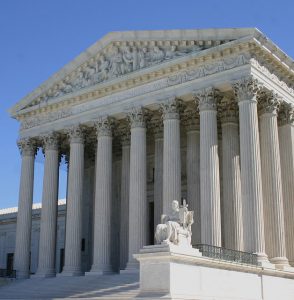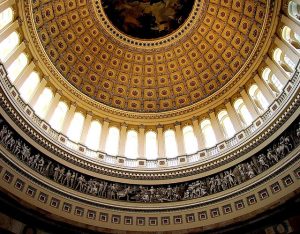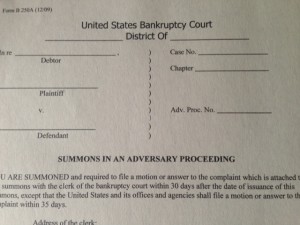
The continuing saga of the impact of the U.S. Supreme Court’s Stern v. Marshall decision took a major turn Tuesday when the Court issued its ruling in the Wellness International Network, Limited v. Sharif case (follow link for copy of opinion). Before considering the decision and its significance, let’s first take a look at some past hits — bankruptcy court authority-style.
The Big Picture: The Stern v. Marshall Decision. In its 2011 summer blockbuster Stern v. Marshall, decided by a 5-4 vote, the U.S. Supreme Court held that even though Congress designated certain state law counterclaims as “core” proceedings, Article III of the U.S. Constitution prohibits bankruptcy courts from finally adjudicating those claims. Like a good cliffhanger, Stern v. Marshall left a number of questions unanswered, including the following:
- Can a bankruptcy court enter a final judgment on “Stern claims” with the parties’ consent?; and
- Can a bankruptcy court treat a “core” Stern claim as “non-core” under 28 U.S.C. Section 157 and follow the statutory procedures for submitting proposed findings of fact and conclusions of law to the district court for de novo review, even though there appears to be a gap in the statute and it does not expressly provide for that approach?
A Limited Sequel: The Arkinson Decision. In a narrow 2014 decision in Executive Benefits Insurance Agency v. Arkinson, the Court answered only the second question, unanimously ruling that when hearing core Stern claims, bankruptcy courts can follow the non-core statutory procedure of submitting proposed findings of fact and conclusions of law to the district court for de novo review. However, the Court did not address the first question, leaving the issue of consent to live or die “another day.”
“Another Day” Finally Arrives: The Wellness Decision. With this week’s decision in Wellness, that other day arrived. In a 6-3 decision written by Justice Sotomayor, the Court held that parties to a Stern claim can constitutionally consent to having final judgment issued by a non-Article III bankruptcy judge. The Court further held, with the support of only five justices, that the requisite consent can be implied and need not be express as long as it’s “knowing and voluntary.”
The Wellness case involved an adversary proceeding by a creditor seeking declaratory relief on alter ego and other grounds, among other claims, that certain trust assets were property of the estate. In its decision, the Court apparently assumed without deciding that this presented a potential Stern claim.
In reaching its conclusion that “litigants may validly consent to adjudication by bankruptcy courts,” the Court relied heavily on the 1986 decision in Commodity Futures Trading Comm’n v. Schor, 478 U. S. 833 (1986), and two decisions involving federal magistrates, Gomez v. United States, 490 U. S. 858 (1989), and Peretz v. United States, 501 U. S. 923 (1991):
The lesson of Schor, Peretz, and the history that preceded them is plain: The entitlement to an Article III adjudicator is ‘a personal right’ and thus ordinarily ‘subject to waiver,’ Schor, 478 U. S., at 848. Article III also serves a structural purpose, ‘barring congressional attempts ‘to transfer jurisdiction [to non-Article III tribunals] for the purpose of emasculating’ constitutional courts and thereby prevent[ing] ‘the encroachment or aggrandizement of one branch at the expense of the other.” Id., at 850 (citations omitted). But allowing Article I adjudicators to decide claims submitted to them by consent does not offend the separation of powers so long as Article III courts retain supervisory authority over the process.
The question here, then, is whether allowing bankruptcy courts to decide Stern claims by consent would ‘impermissibly threate[n] the institutional integrity of the Judicial Branch.’ Schor, 478 U. S., at 851.
* * *
[W]e conclude that allowing bankruptcy litigants to waive the right to Article III adjudication of Stern claims does not usurp the constitutional prerogatives of Article III courts. Bankruptcy judges, like magistrate judges, ‘are appointed and subject to removal by Article III judges,’ Peretz, 501 U. S., at 937; see 28 U. S. C. §§152(a)(1), (e). They ‘serve as judicial officers of the United States district court,’ §151, and collectively ‘constitute a unit of the district court’ for that district, §152(a)(1). Just as ‘[t]he ‘ultimate decision’ whether to invoke [a] magistrate [judge]’s assistance is made by the district court,’ Peretz, 501 U. S., at 937, bankruptcy courts hear matters solely on a district court’s reference, §157(a),which the district court may withdraw sua sponte or at the request of a party, §157(d). ‘[S]eparation of powers concerns are diminished’ when, as here, ‘the decision to invoke [a non-Article III] forum is left entirely to the parties and the power of the federal judiciary to take jurisdiction’ remains in place. Schor, 478 U. S., at 855.
Importantly, the Court distinguished and limited Stern:
Our recent decision in Stern, on which Sharif and the principal dissent rely heavily, does not compel a different result. That is because Stern—like its predecessor, Northern Pipeline—turned on the fact that the litigant “did not truly consent to” resolution of the claim against it in a non-Article III forum. 564 U. S., at ___ (slip op., at 27).
* * *
Because Stern was premised on non-consent to adjudication by the Bankruptcy Court, the ‘constitutional bar’ it announced, see post, at 14 (ROBERTS, C. J., dissenting), simply does not govern the question whether litigants may validly consent to adjudication by a bankruptcy court.
An expansive reading of Stern, moreover, would be inconsistent with the opinion’s own description of its holding. The Court in Stern took pains to note that the question before it was ‘a ‘narrow’ one,’ and that its answer did ‘not change all that much’ about the division of labor between district courts and bankruptcy courts. Id., at ___ (slip op., at 37); see also id., at ___ (slip op., at 38) (stating that Congress had exceeded the limitations of Article III ‘in one isolated respect’). That could not have been a fair characterization of the decision if it meant that bankruptcy judges could no longer exercise their longstanding authority to resolve claims submitted to them by consent. Interpreting Stern to bar consensual adjudications by bankruptcy courts would ‘meaningfully chang[e] the division of labor’ in our judicial system, contra, id., at ___ (slip op., at 37).
Reacting to Chief Justice Roberts’s dissent predicting future encroachment by Congress on Article III courts, the Court responded with a memorable phrase:
To hear the principal dissent tell it, the world will end not in fire, or ice, but in a bankruptcy court.
(Some debtors and creditors might agree — great plot for a movie?)
On whether express consent is required, the Court stated:
Nothing in the Constitution requires that consent to adjudication by a bankruptcy court be express. Nor does the relevant statute, 28 U. S. C. §157, mandate express consent; it states only that a bankruptcy court must obtain“the consent”—consent simpliciter—“of all parties to the proceeding” before hearing and determining a non-core claim. §157(c)(2).
* * *
It bears emphasizing, however, that a litigant’s consent—whether express or implied—must still be knowing and voluntary. Roell [v. Withrow, 538 U. S. 580 (2003)] makes clear that the key inquiry is whether ‘the litigant or counsel was made aware of the need for consent and the right to refuse it, and still voluntarily appeared to try the case’ before the non-Article III adjudicator.
The Critics. In a vigorous dissent, Chief Justice Roberts, the author of the Court’s Stern decision, accused the Wellness majority of “an imaginative reconstruction” of Stern:
As the majority sees it, Stern ‘turned on the fact that the litigant ‘did not truly consent to’ resolution of the claim’ against him in the Bankruptcy Court. Ante, at 15 (quoting 564 U. S., at___ (slip op., at 27)). That is not a proper reading of the decision. The constitutional analysis in Stern, spanning 22 pages, contained exactly one affirmative reference to the lack of consent. See ibid. That reference came amid a long list of factors distinguishing the proceeding in Stern from the proceedings in Schor and other ‘public rights’ cases. 564 U. S., at ___–___ (slip op., at 27–29). Stern’s subsequent sentences made clear that the notions of consent relied upon by the Court in Schor did not apply in bankruptcy because ‘creditors lack an alternative forum to the bankruptcy court in which to pursue their claims.’ 564 U. S., at ___ (slip op., at 28) (quoting Granfinanciera, 492 U. S., at 59, n. 14). Put simply, the litigant in Stern did not consent because he could not consent given the nature of bankruptcy.
There was an opinion in Stern that turned heavily on consent: the dissent. 564 U. S., at ___–___ (opinion of BREYER, J.) (slip op., at 12–14). The Stern majority responded to the dissent with a counterfactual: Even if consent were relevant to the analysis, that factor would not change the result because the litigant did not truly consent. Id., at ___–___ (slip op., at 28–29). Moreover, Stern held that ‘it does not matter who’ authorizes a bankruptcy judge to render final judgments on Stern claims, because the ‘constitutional bar remains.’ Id., at ___ (slip op., at 36). That holding is incompatible with the majority’s conclusion today that two litigants can authorize a bankruptcy judge to render final judgments on Stern claims, despite the constitutional bar that remains.
Chief Justice Roberts’s comment that it was the Stern dissent that relied heavily on consent highlights that two members of the Stern majority, Justices Kennedy and Alito, joined the four dissenting Justices in Stern to form the 6-3 majority in Wellness. Perhaps with practical considerations in mind, Justices Kennedy and Alito voted in Wellness to limit Stern’s constitutional bar to situations in which the parties do not consent to entry of a final judgment by the bankruptcy court.
Justice Thomas filed his own dissenting opinion, raising interesting questions he believed both the majority and Chief Justice Roberts overlooked. These included the nature of consent, separation of powers issues, and historical exceptions in which non-Article III adjudications have been permitted.
Bankruptcy Courts In A Leading Role. Together, Wellness and Arkinson mean that bankruptcy courts will continue to land a big part in hearing all types of bankruptcy matters, including Stern claims, despite the fears of some following the Stern decision.
- For a Stern claim, if the parties give “knowing and voluntary” consent, even if not express consent, the bankruptcy court will have constitutional authority to enter a final judgment. (As the Court noted in footnote 13 of the Wellness decision, if proposed revisions to Federal Rules of Bankruptcy Procedure 7008 and 7012 take effect, a statement giving or withholding express consent will be required by rule in adversary proceedings.)
- For a Stern claim, if the parties do not consent, the bankruptcy court will still be able to follow the non-core statutory procedure and submit proposed findings of fact and conclusions of law to the district court for de novo review.
- For core claims that are not Stern claims, as before, the bankruptcy court can enter a final judgment without consent of the parties.
- For non-core claims, as before, the bankruptcy court can enter final judgment if the parties consent and, if not, will submit proposed findings of fact and conclusions of law to the district court for de novo review.
Conclusion. In what will likely be a box office hit with bankruptcy attorneys, the Supreme Court in Wellness substantially limited the impact of the Stern v. Marshall decision, allowing bankruptcy courts to enter final judgments, even on Stern claims, with consent of the parties. Consent has to be knowing and voluntary, but as often happens with non-core claims, parties may well choose to buy a ticket and have the bankruptcy court enter final judgment on Stern claims. Had Wellness gone the other way, the already overloaded district courts could have been faced with many more de novo review proceedings. The prospect of such coming attractions has likely been averted with the Wellness opinion, written — perhaps not coincidentally — by the only former district court judge on the Supreme Court, Justice Sotomayor.
Image Courtesy of Flickr by David







